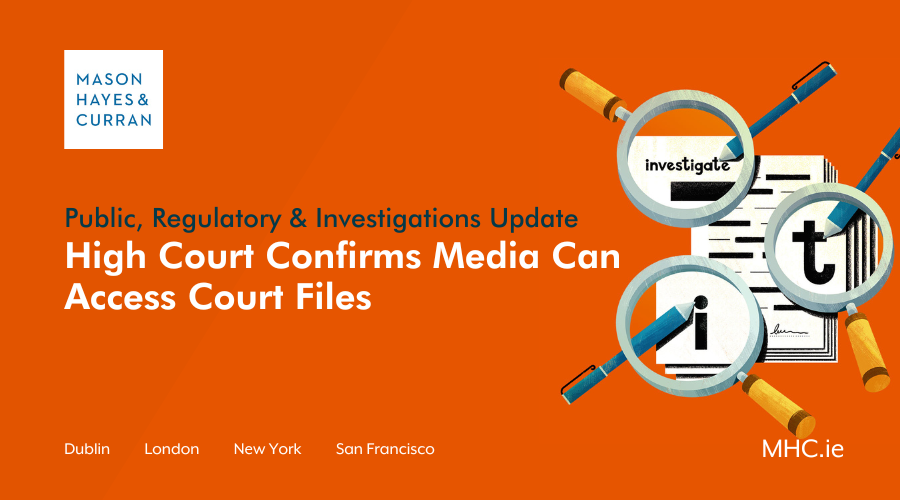High Court Confirms Media Can Access Court Files

A recent High Court case has reiterated that members of the media can access and report on documents on court files. This is the case even where those documents have not been ‘opened’ in Court. Lisa Joyce, Public, Regulatory & Investigations partner, reviews this decision and the principle underlying it - that justice should be conducted in public.
The recent case of Law Society of Ireland v Ellis[1]
considered the entitlement of the media to access and report on documents that are in a court file but have not been “read aloud” in open court. The respondent solicitor in the proceedings, Ms Ellis, was concerned that personal and professional matters concerning her had been leaked to the media after the case was heard. Therefore, she applied to the Court for permission to obtain a transcript of the digital recording of that hearing.
Background
The hearing in these proceedings took place in 2022. As is common practice, the trial judge had the opportunity to read the affidavit and accompanying exhibits submitted by the Law Society in advance of the hearing. As a result, the papers were not read out in court in full. However, the solicitor acting for the Law Society outlined the nature of the case relating to Ms Ellis in oral submissions to the Court.
When the proceedings concluded, Ms Ellis became concerned that the contents of the Law Society’s affidavit had been referred to by the print media despite the fact that it had not been read aloud in court. She alleged that the material had been “leaked” to the media and sought a transcript of the proceedings to determine what information had entered the public domain during the hearing.
Decision
Mr Justice Simons granted Ms Ellis’ request for a transcript of the earlier proceedings. However, he clarified that there was nothing untoward in the media having access to an affidavit that had not been read aloud in open court.
He emphasised that, apart from certain exceptions such as in family law proceedings, members of the print and broadcast media are generally entitled to report on anything that is relevant to court proceedings. This includes documents on the court file, such as affidavits, even where those documents have not been read out during a public hearing. This is because the documents still form part of the information and material on which the Court is relying to make its decision, and on which the exchanges between judge and counsel are based.
Mr Justice Simons noted the constitutional requirement of Article 34.1 of the Constitution that justice be administered in public. He also referred to his previous judgment in In Re Independent News and Media plc,[2] which noted that section 159(7) of the Data Protection Act 2018 allows the disclosure of personal data contained in a court record for the purpose of facilitating fair and accurate reporting of a case.
Conclusion
This judgment reiterates that, as a general rule, the media are entitled to access and report on the contents of any documents on the court file, even if those documents have not been read out in open court. It is important for litigants to be aware of this, particularly given the increasingly common practice of judges reading court papers ahead of time, to improve the efficiency of court hearings.
There are exceptions, such as in family proceedings, or if an application has been made for privacy on the basis that other constitutional rights of the person concerned override the requirement of publicity. However, where a decision limiting reporting is made, the courts will put in place the least restrictive measures possible, given the importance placed on the public administration of justice.
For more information and expert advice, contact a member of our Public, Regulatory & Investigations team.
The content of this article is provided for information purposes only and does not constitute legal or other advice.
[1] [2023] IEHC 728
[2] [2020] IEHC 384
Share this:


